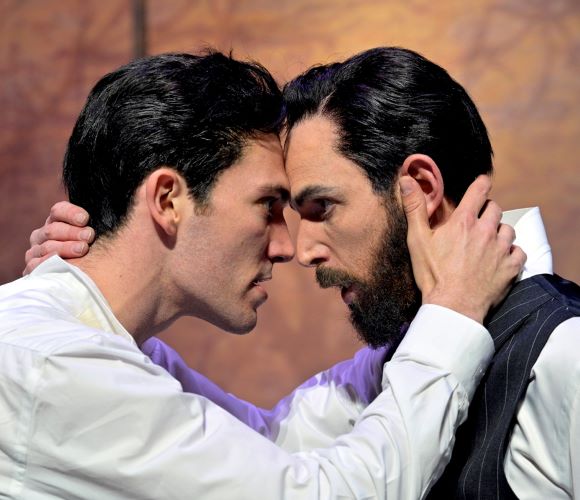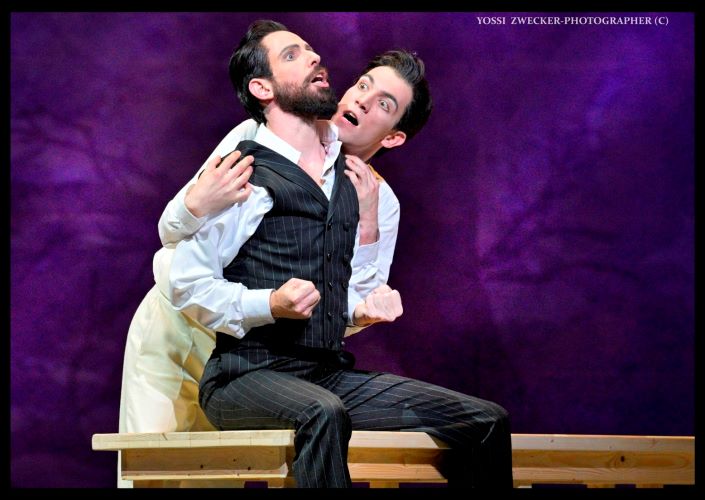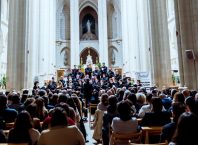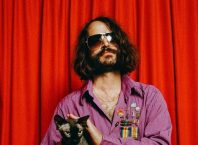
Theodor, the brilliant and deeply stirring original Israeli opera, is inspired by the life and work of Theodor Herzl, visionary of the State of Israel. Composed by Yonatan Cnaan, and directed by Ido Ricklin, who wrote the libretto, Theodor returns to the stage of the Israeli Opera with performances on December 20th and 22nd, conducted by Nimrod David Pfeffer. A fascinating character study, the opera explores two periods in the life of young Theodor Herzl – as a student in Vienna, and as a 35-year-old during the Dreyfus trial in Paris. Opening the Israeli Opera’s 2023 – 2024 season, Theodor comes at a time when reflecting on the vision and values of the State of Israel, and the distressing rise of worldwide antisemitism, is profoundly relevant.
Two narrative threads are intertwined in the opera – that of young Theodor, the first Jewish student accepted to the “Albia” (the National Pro-German Student’s Union), and that of 35-year-old Herzl, a journalist covering the Dreyfus trial in Paris. Noam Heinz portrays the young Theodor, and Oded Reich, in a memorable, moving performance, portrays the older Herzl, who has experienced the vicissitudes and pains of life, not the least of which is the breakdown of his marriage, as his wife Julie – in an outstanding performance by Anat Czarny – wants to leave him. The drama reaches its climax as the younger and older Theodor meet onstage, in a duet of emotional turmoil that seems impossible to resolve, yet the dreams and vigor of his youth inspire the weary and jaded Herzl to a new vision – a state for the Jewish people.

From the opera libretto:
Herzl: “Every place
That we will flee to, the poison is there.
Theodor: Find a place that we can flee to.
Herzl: Every place
That we will flee to – we will always be the strangers.
Theodor, Herzl: I am always the stranger
Always “The Jew”
Theodor: We must leave.
Herzl: To where?
Theodor: Think…
Herzl: To a State of Jews”
The idea of creating an opera based on the life of Theodor Herzl was raised by prominent philanthropist Daniel Jusidman, who assisted in the making of the opera – which took several years, through the Jusidman Foundation.
Composer Yonatan Cnaan’s comments on writing the opera: “The opera Theodor describes the path taken by the lonely and wretched Herzl through to the vision of the Jewish state. Instead of concentrating on historic events, the opera delves into his internal, emotional struggle. This inspired the composition of pulsating, repetitive, dark music. I personally defined “cinematic music”. It expresses the tortured space in which Herzl moved – between bitter despair at the political situation in Europe, and a feeling of complete failure in his marriage. Out of this darkness, memories of earlier periods in his life surface. The adult Herzl recalls the young Theodor – the charismatic student, determined to integrate, to belong. The music enlivens these flashbacks to the past, like a distant memory, a bit foggy at first, then gradually painted with stronger colors. The joy of life and youth are revived in melody and dance, in the German-Austrian spirit, and in the spirit of the time. When I began composing Theodor about two years ago, I could not imagine that we, our generation, would find ourselves at an historic turning point, relating to the future of the Jewish state. As the writing progressed, real events pervaded the creation, making it more relevant than ever before. It presented us with an opportunity to review Herzl’s texts and the lofty liberal principles which formed the basis of his doctrine”.
Director Ido Ricklin’s comments on the writing and staging of Theodor: “Herzl’s biography usually commences with the period during which he conceived the Zionist vision. It appears that Herzl’s life as we know it began at the moment he attended the trial of Alfred Dreyfus in Paris as a 35-year-old journalist, which spurred him on to the conclusions that led to his vision. This is the ethos of the Father of Zionism, as was conveyed to me and as I understood in my youth.
When I began writing this new work about Herzl’s life, I turned to those earlier parts of his biography – parts which he saw fit to embellish, to edit or to erase. When I first read the wonderful biography written by Amos Elon, I noticed an event in Herzl’s youth – when he joined, became wary of, and was expelled from the National Student’s Union “Albia”.
More than anything else, I was fascinated by the dissonance between what was described in the biography and the laconic description in Herzl’s memoirs, which in effect denies most of this episode.
The unfolding of historic events, as described in the biography, certainly re-enforces the intentions of Herzl the adult, and the necessity to find a solution for the Jewish problem. Why did Herzl recoil from this memory? Why does he recall this in a pacifying, even embellished tone? I thought to myself – when a person censors a dramatic moment, during which he encountered disappointment and humiliation – does this not indicate trauma? Trauma which, perhaps, influenced his life? The more I thought about it, the more I saw a theme linking both stories. The small, private, touching story, about a Jewish adolescent who wanted to be accepted into the Nationalist Student’s Union, and who was eventually expelled in shame, and the other story, the historic story, about a Jewish officer who was accused of treason against his homeland – Alfred Dreyfus”.
Bold, thrilling, and inspirational, Theodor is an exhilarating work of art, and one that has special meaning for Jews and Israelis. Theodor is a contemporary masterpiece! Courageous, and wonderfully subversive, it had me up on my feet at the premiere in May, shouting as if I was at a rock concert! Bravo to Yonatan Cnaan, Ido Ricklin & the entire creative team! Not to be missed!
Performance dates: Wednesday, December 20th at 18:00; Friday, December 22nd at 13:00. Tickets are available online on the Israeli Opera website: https://www.israel-opera.co.il/eng, or call: 03-692777. An hour prior to each performance there will be an introductory lecture in Hebrew of about 30 minutes in the theater. Entrance to the lecture is free for ticket holders for that evening’s performance.





